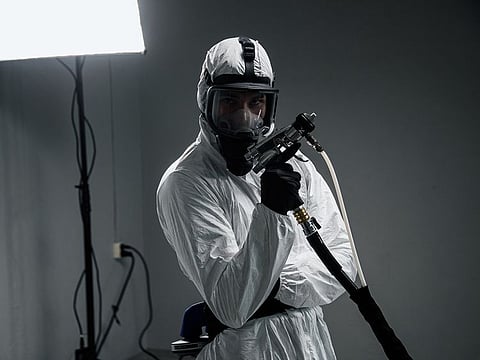Nanoksi Finland wins Dubai's Aviation X Lab Accelerate Traveller Wellbeing Challenge
Its self-disinfecting coating prevents the spread of viruses and bacteria through surfaces

The COVID-19 pandemic changed how we view our surroundings. Microbes can be spread just because people touched the same object. The company Nanoksi Finland has developed an innovative sprayable solution which uses photocatalysis – where light increases a chemical process – which can kill 98% of microbes within two hours.
“The technology is very versatile,” explains Nanoksi Finland CEO Pasi Keinänen. “We have used it on glass, screens, plastic, wood, metal, ceramic and textiles, for example.”
The invention was impressive enough to beat 106 other entries in the Aviation X Lab Accelerate Traveller Wellbeing Challenge, which was awarded by Dubai Future Foundation and Emirates Airlines.
Tested by Emirates
Emirates tested the solution in different areas, such as first-class limousines, baby strollers and biometric boarding gates. The results were impressive: for example, the ATP measurement of organic dirt on transit busses fell from 2,113 pre-coating to 51 a month after. Emirates is beginning to use Nanoksi’s solution in their limousines, busses and lounges at Dubai International Airport. However, the solution has already been widely deployed in other countries.
“We have applied it in over 2,000 projects, including shopping centres, offices and in partnership with manufacturers of consumer products,”
Keinänen continues. “We’re really excited about our solution’s possibilities in aviation. It could make flying much safer for passengers and crew.”
The coating, called FOTONIT®, destroys pathogenic viruses, bacteria, yeasts and moulds. It is working constantly, so surfaces remain hygienic even between cleanings. The coating is invisible, flexible and porous. FOTONIT® is also highly durable: even high-use surfaces only need an annual reapplication. Additionally, it is easy and fast to apply. For example, four buses can be treated in one hour.
Novel solution powered by light
There are other photocatalysis ideas in the market, but Nanoksi Finland uses a unique titanium dioxide solution. While other systems might need direct ultraviolet light, Nanoksi Finland’s can use a greater variety of light in the spectrum. In effect, the nanoparticles have “antennas” which allow them to pick up and use a wider range of light.
“Another important thing about our process is that it doesn’t use chemicals which could be harmful for human health or the environment,” says Keinänen.
The technology was developed in Tampere University and was spun-off to undergo further development and commercialisation. The company directs the entire value chain from R&D to manufacturing to deployment.
Saving lives
Nanoksi is expanding their product portfolio and are growing rapidly. Everyone hopes that the COVID-19 pandemic will soon come to an end, but Keinänen points out that we can’t lower our guard.
“There are more pathogens than just the coronavirus. Think of hospital acquired infections, for example,” he says. “We believe that with our solutions we can help save not only enormous financial costs, but more importantly thousands of lives.”
If you would like to learn more about FOTONIT®, come see Nanoksi Finland at the Dubai Expo or visit Nanoksi.com.
Sign up for the Daily Briefing
Get the latest news and updates straight to your inbox



